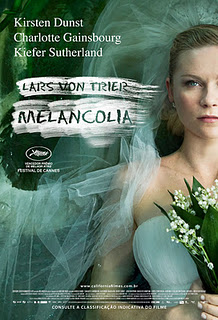I suppose it’s appropriate that with today’s economic and
environmental disasters looming large, we are seeing a number of films
predicting the end of mankind in ways from which we cannot protect ourselves.
Three new films that I saw recently in close proximity, all
spelled out our doom in very different ways, with little or no hope of
survival. Perhaps the current global economic crisis has people wondering what
we’ve gotten ourselves into and how the end will come, instead of how it can be
prevented. It’s as if we know that we cannot save ourselves from our own
destructive nature, and we expect the Earth to retaliate for our blatant abuses
and tell us that our time is up. Will the end of our planet be our own undoing,
or will it come through some natural, unstoppable disaster?
These three films all explore the inevitable global end and
extinction of mankind on Earth. Two of them by natural phenomena from which
there is no protection; Melancholia
and Take Shelter, and if that doesn’t
humble you, there is a documentary that very clearly illustrates how we will be
the architects of our own demise; Surviving
Progress.
Melancholia and Take Shelter are both about individuals
looking up at the sky and, through instinct or visions or dreams, somehow sense
a coming global disaster, but are unable to express this to others except by
what appears to be very unusual and disturbing behavior to the people around
them. Both movies center on this person and their strange behavior and the
effect it has on their family or community. When the disaster eventually
strikes, they seem to be the ones, at least mentally, to be most prepared for
it, if not physically.
Visually both these films are appropriately ominous and
eerily photographed with dreamlike, nightmare images and minimal visual effects.
As these films are dramas that focus on intimate human relations rather than
the physical destruction of the planet, as with Roland Emmerich’s 2012 (2009), they are slow and pensive
films that can be depressing and boring for some.
Surviving Progress
is a documentary about our capacity to kill the planet and ourselves along with
it. It argues that, while we as a society have progressed in our technology and
our culture has changed as a result, we, as people, still have all the same
primitive instincts of our hunting and gathering ancestors, and that, what we
call progress, is actually becoming detrimental to our survival.
Our ability to question ‘why?’ has made us successful in the
past but we are now too successful to the point that we are destroying
ourselves and the planet. The same abilities that helped us survive in our early history
are destroying our planet today. To illustrate this, the movie uses an example
from our past, when, as cavemen, we hunted Mammoths to sustain us with food and
tools, and we became good at killing them. But eventually we became too good when someone figured out that we could kill many Mammoths at once by
herding them over a cliff. Mammoths quickly became extinct, depriving us of an
important renewable resource that would have sustained future generations
indefinitely. We still have the same mentality today. Consumerism is destroying
us and our planet, whether we are stuffing our bodies with food or stuffing our
houses with stuff, we are literally consuming ourselves to death.
The film now turns to Wall Street, which is seen as an oligarchy
of affluent people with political power to effect change to benefit their
cause, which is to make more money and become more affluent. Corporations and
economists, says David Suzuki, are totally out to lunch with their economic
model of growth, which is completely unrealistic for our world. Corporations
and the affluent would rather see 90% of the planet’s people starve and die,
and see all the planet’s forests and resources destroyed before ever giving up
their desire for more wealth.
We have gone from destroying Mammoths to plundering the last
of our natural global resources with no thought for the future. It’s a grim
tale of human greed and ignorance that will make Melancholia and Take Shelter seem
like the justice we deserve. But as a character from Melancholia says ‘Don’t grieve for the Earth, the Earth is evil.’
And an expert in Surviving Progress
characterizes humans as behaving like a virus, killing everything in its path.
JP







